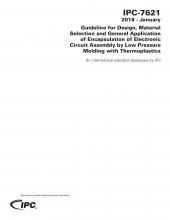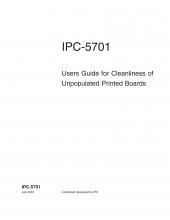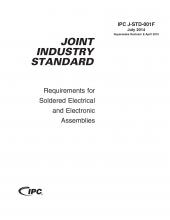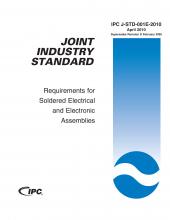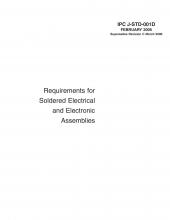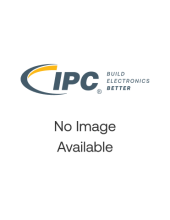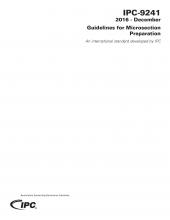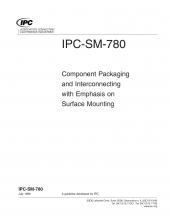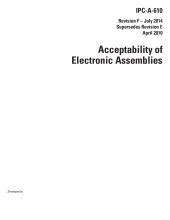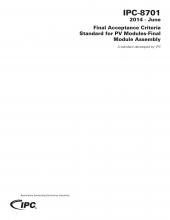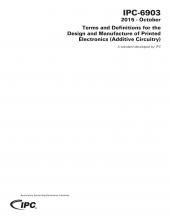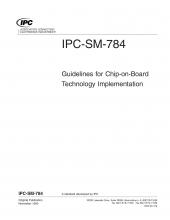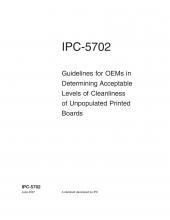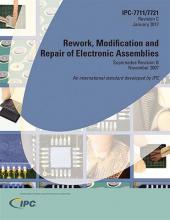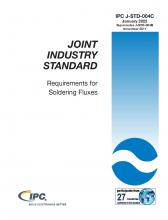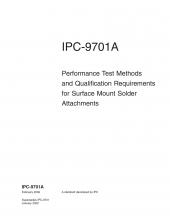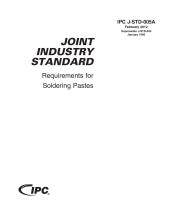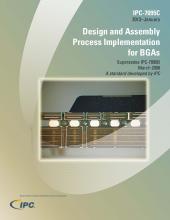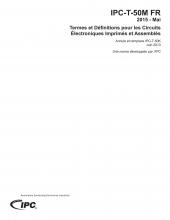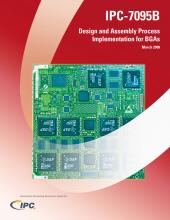Your results
Document #
Language
Products
Encapsulation, for the purpose of IPC-7621 standard, is defined as a low pressure molded thermoplastic, e.g., polyamide, which is brought to a liquid state and injection molded and (rather quickly) returned to a temperature below its melting point., forming a durable yet pliable (rubbery-like) form. The desired performance characteristics of low pressure molding (LPM) encapsulation depend on the...
Tackling PCB cleanliness is a tough job; residues on printed circuit boards are directly related to the reliability of the produced hardware and can result in serious failures if not known or monitored. But how do you measure "cleanliness"? How clean is "clean"? The IPC-5701 provides guidance into how these issues should be approached and specified in purchasing documents, addressing levels of...
IPC J-STD-001F is recognized worldwide as the sole industry-consensus standard covering soldering materials and processes. This revision includes support for both traditional solder alloys and for lead-free manufacturing. Examples of some of the significant changes are revision to plated-through hole, PTH, minimum fill requirements; criteria for two new SMT termination types; and expanded...
J-STD-001E is recognized worldwide as the sole industry-consensus standard covering soldering materials and processes. This revision includes support for lead free manufacturing, in addition to easier to understand criteria for materials, methods and verification for producing quality soldered interconnections and assemblies. The requirements for all three classes of construction are included...
Download the free Amendment 1 (.pdf) that resolves conflict in measles criteria between J-STD-001D, IPC-A-610D, IPC-6012B and IPC-A-600G. Lead free acceptance criteria and pictures now included! Reformatted-easier to find acceptance criteria! Space Applications Electronic Hardware Addendum Published November 2006, with Amendment 1 Published September 2009. Download the Addendum. J-STD-001D is...
Originally developed for J-STD-001B, it is also applicable to current assembly standards. Electronics manufacturers are faced with the difficult task of proving that a candidate manufacturing process can produce acceptable hardware, either to the customer of the product, or for internal quality control. Users have to determine many of the process qualification steps on their own. This document...
This standard is intended as a guideline in the proper preparation of a metallographic sample (microsection) of a printed board. The finished microsection is used for evaluating the quality of the laminate system and plated structures (e.g. PTHs and vias). Microsection sample preparation is regarded by many as a highly developed skill. The guidelines in this standard discuss the many variables and...
IPC-A-610 is the most widely used electronics assembly standard in the world. A must for all quality assurance and assembly departments, IPC-A-610E illustrates industry-accepted workmanship criteria for electronics assemblies through full-color photographs and illustrations. Topics include flex attachment, board in board, part on part, lead free, component orientation and soldering criteria for...
This document examines key issues in advanced packaging techniques. Provides information on what types of parts are available, the techniques and processes necessary for their proper use, possible advantages/disadvantages or problems, how to start implementation and where to find additional information. 138 pages. Released March 1988.
IPC-A-610F Amendment 1 is now available. See Related items. IPC-A-610 is the most widely used electronics assembly standard in the world. A must for all quality assurance and assembly departments, IPC-A-610F illustrates industry-accepted workmanship criteria for electronics assemblies through detailed statements reflecting acceptable and defect conditions, supported by full-color photographs and...
Mechanical bend and shock tests are routinely performed on SMT assemblies to ensure that they can sustain anticipated production, handling and end use conditions. The strains and strain rates applied to SMT assemblies during bend and shock testing can lead to a variety of failure modes in the vicinity of the solder joints. This document provides test methods to evaluate the susceptibility of...
This standard addresses semiconductor flip chip design requirements. Provides information for using standard semiconductor substrates, materials, assembly and test methods with established fabrication, bumping, test and handling practices. Electrical, thermal and mechanical chip design parameters and methodologies are covered in the standard, as well as the reliability aspects associated with...
IPC-8701 presents acceptance guidelines for the solar panel in final module assembly. The intent of this standard is to cover crystalline solar modules.Some of the content may be applicable to other photovoltaic modules such as thin film. The standard reviews and includes acceptance guidelines for incoming and finished frames, frame assembly, sealant, tape, junction box assembly, and bus bar...
Provides information on design characteristics and the application of solderless surface mount connectors, including conductive adhesives to aid IC package and board interconnection. 34 pages. Released January 1994.
This standard provides industry-approved terms and definitions to create a common language for users and suppliers to develop electronics products that utilize printed electronics alone or as additive processes combined with traditional rigid, flexible and rigid-flex PWB assemblies Released October 2015.
Survey-based study presents data and analysis on the EMS industry, examining trends in sources of revenue, revenue per employee, services offered, markets served, manufacturing technology, capital investment, spending on equipment and materials and market size including forecasts and potential for market expansion. This study is based on data provided by a representative sample of 120 EMS...
Discusses chip types, board selection, design issues and thermal transfer methods for Chip on Board (COB) applications. Details wire bonding, TAB and flip chip designs and provides information on mounting materials, including adhesives, wires and various mechanical bonding techniques. 37 pages. Released November 1990.
Every electronics manufacturer, whether an original equipment manufacturer (OEM) or electronics manufacturing services (EMS) company, must determine if the unpopulated printed boards entering the assembly process have an adequate level of cleanliness. The question of “how clean is clean enough?” is one that has no definitive answer, as there is no "golden number" for board cleanliness. The issue...
This guide provides procedures for rework, repair and modification of printed board assemblies. Included in this revision are the procedures previously released as change pages, an updated general information and common procedures section, new procedures for BGAs using focused IR Reflow Systems with integral preheater and general updates to all other procedures.
The IPC J-STD-004C standard prescribes general requirements for the classification and characterization of fluxes for high quality solder interconnections. The IPC J-004C standard may be used for quality control and procurement purposes.
Provides specific test methods to evaluate the performance and reliability of surface mount solder attachments of electronic assemblies. Establishes levels of performance and reliability of the solder attachments of surface mount devices to rigid, flexible and rigid-flex circuit structures. When used with IPC-SM-785, it provides an understanding of the physics of SMT solder joint failure and an...
This standard lists requirements for qualification and characterization of solder paste. It references test methods and criteria for metal content, viscosity, slump, solder ball, tack and wetting of solder pastes. Additional support is provided in IPC-HDBK-005, Guide to Solder Paste Assessment (not included with purchase of this standard). Supersedes J-STD-005.
Implementing ball grid array (BGA) and fine-pitch ball grid array (FBGA) technology presents some unique challenges for design, assembly, inspection and repair personnel. IPC-7095C delivers useful and practical information to anyone currently using BGAs or FBGAs. Many issues have become especially important due to the change in the alloys of the ball, the ball shape, and the attachment procedures...
Ce document essentiel pour l’industrie fournit des descriptions et des illustrations de la terminologie de l’industrie d’assemblage électronique afin d’aider les utilisateurs et leur clients à casser les barrières linguistiques. La révision M contient plus de 220 termes nouveaux ou révisés, incluant la nouvelle terminologie pour les procédés de tropicalisation, d’enrobage et d’encapsulation, la...
Implementing Ball Grid Array (BGA) and Fine-Pitch Ball Grid Array (FBGA) technology presents some unique challenges for design, assembly, inspection and repair personnel. IPC-7095B delivers useful and practical information to anyone currently using BGAs or considering a conversion to area array packaging formats. This has become especially important due to the change in the alloys being used, both...
Coming Soon
IPC-7095E: Design and Assembly Process Implementation for Ball Grid Arrays (BGAs)
IPC-7530B: Guidelines for Temperature Profiling for Mass Soldering Processes (Reflow & Wave)
IPC-2294: Design Standard for Printed Electronics on Rigid Substrates
IPC-6904: Qualification and Performance Specifications for Printed Electronics on Rigid Substrates
IPC-4105: Specification for Metal Base Copper Clad laminates for Rigid Printed Boards

